Drawing from centuries-old coffee traditions and boosted by one of the largest state-backed economic programmes on the planet, Saudi Arabia’s coffee shop market is booming. 5THWAVE speaks to some of the operators riding high in the Kingdom’s rapidly growing branded café segment to find out why coffee has become Saudi Arabia’s new black gold
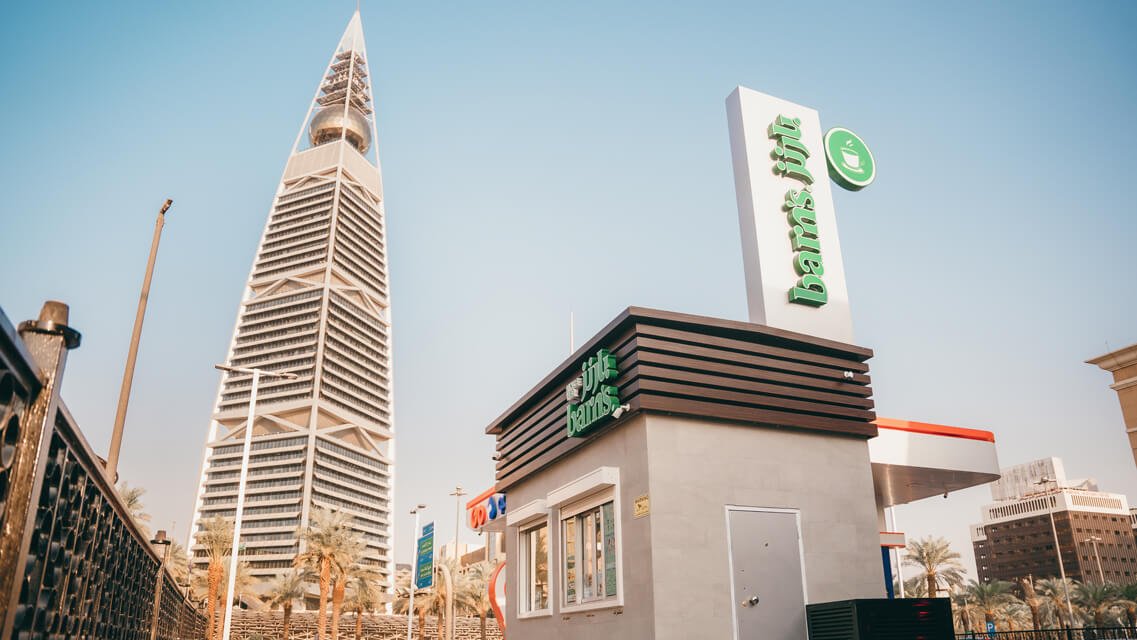.jpg.aspx?lang=en-GB&width=700&height=394)
A Barn's store in Riyadh, Saudi Arabia. The coffee chain currently operates more than 430 stores in its native market | Photo credit: Courtesy of Barn's
Saudi Arabia is a story of remarkable growth. A young nation steeped in tradition, the modern Kingdom was founded in 1932 by Arab political and religious leader Abdulaziz bin Abdul Rahman, known in the West as Ibn Saud.
The discovery of oil on 3 March 1938 would catapult the fledgling nation from a largely subsistence-based economy into the world’s second largest oil producer after the United States. In May 2022 alone, the state-owned Saudi Arabian Oil Company (ARAMCO) pulled in $1bn a week, with the Saudi government currently boasting a $163bn budget surplus, up from $44bn in 2021.
Yet, as the world attempts to wind down fossil fuel dependency, Saudi Arabia, too, is looking to a future beyond oil. Launched in 2016 by Crown Prince Mohammed bin Salman, Vision 2030 is a roadmap for economic diversification, social liberalisation, and the promotion of tourism and hospitality.
Today, a new black gold is playing a key role in the Kingdom’s economic renaissance. Coffee is big business in Saudi Arabia. Boosted by one of the world’s fastest growing developed economies,
World Coffee Portal data shows the Saudi Arabian branded coffee shop market grew 18.5% over the last 12 months to exceed 3,550 outlets, making it by far the largest in the Middle East.
That growth is hardly surprising given the significant resources coffee businesses around the world are funnelling into Saudi Arabia – more than 40% of the Middle East’s 8,800-plus branded coffee shops are currently in the Kingdom.
Underlining its growing influence, Saudi Arabia has produced five of the largest 20 coffee chains in the Middle East, with home-grown specialty operator Barn’s the region’s third largest with more than 430 outlets.
Major international coffee chains, including Starbucks, Costa Coffee and
Tim Hortons, continue to open outlets amid strong demand for aspirational coffee shop experiences. In October 2022, US-based
Dunkin’ opened 30 stores in a single day and plans to operate more than 600 in the Kingdom by the end of 2022.
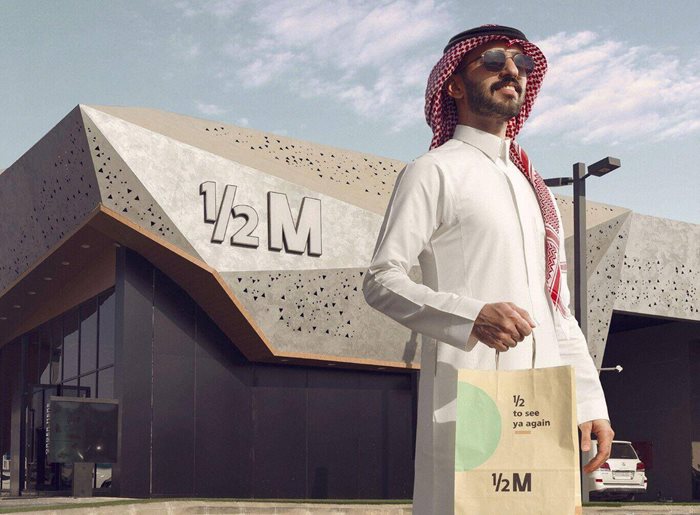
A Half Million Coffee café in Riyadh, where the coffee chain is currently opening four outlets every day | Photo credit: Half Million Coffee
Strong coffee traditions
To fully contextualise Saudi Arabia’s coffee shop boom, it is important to understand the beverage’s deep cultural roots in society.
Qahwa has been consumed on the Arab peninsula since the 15th Century when Arab historian Abd Al Ghaffar documented Sufis roasting and brewing coffee beans to stay awake during religious recitations.
In a deeply Islamic country where alcohol is entirely prohibited, coffee is the centre point at numerous social gatherings and is consumed into the evening. UNESCO’s Intangible Cultural Heritage describes Saudi Arabian coffee culture as a ‘ceremonial act of generosity’.
In the traditional Saudi preparation, coffee beans are coarsely ground and boiled in a coffee pot or dalla. Cardamoms and saffron are often added before being served in small cups known as
finjal.
Those traditions have echoed through the centuries, with 2022 dubbed the ‘Year of Saudi Coffee’ by the Saudi Ministry of Culture. Over the next ten years, the state-backed Saudi Coffee Company will
invest nearly $320m in the country’s domestic coffee growing industry, boosting production from 300 to 2,500 tonnes per year.
“The Kingdom is now looking to build on tradition and expand its coffee growing regions. The local coffee industry is part of its economic diversification plan that looks to develop many sectors, including food and agriculture”, says Mayada Badr, CEO of the Culinary Arts Commission.
“The government is empowering youth and women in hospitality”
Sara Alali, coffee educator and founder, THAT Boutique Café
“We believe that with the right assistance, local coffee manufacturers will be able to expand their operations even further, exporting Saudi coffee to foreign markets,” she adds.
Sara Alali, a coffee educator and founder of THAT Boutique Café in Riyadh, says Saudi Arabia’s coffee traditions are the bedrock of its coffee shop success story.
“Coffee is an integral part of our culture. We have 24-hour cafés and people will drink coffee from the early morning until late at night,” she says.
Alali, who has represented her country in the Cezve/Ibrik Championship, says the Saudi coffee shop market is “booming,” not just in Riyadh, but in other major cities, such as Jeddah and Buraydah.
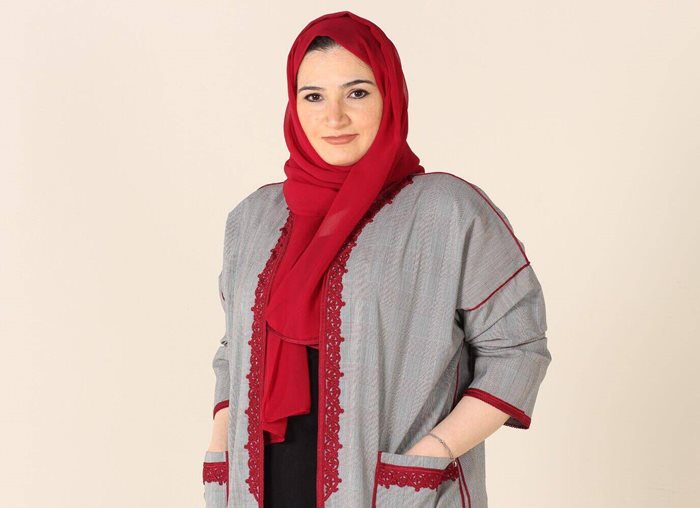
Sara Alali, coffee educator and founder, THAT Boutique Café, Riyadh, Saudi Arabia | Photo credit: Courtesy of Sara Alali
Her entrepreneurial journey reflects profound developments occurring in Saudi society, particularly concerning the role of women. A central tenet of Vision 2030 is recognising Saudi women as a “significant asset” for economic growth. This has resulted in a strengthening of women’s rights, notably a 2017 decree permitting women to drive, gain greater access to education and attain employment across a wide range of sectors.
In 2016 Alali set up an indoor pop-up café to circumvent rules preventing her from working behind the bar. Today, the situation is very different, with the government now actively encouraging female participation in hospitality. Gender segregated cafés, including her own, are also increasingly a thing of the past.
“The government is empowering youth and women in hospitality. They're investing heavily because tourism is growing so we need to have a strong hospitality industry – 90% of my café team are women,” she says.
“We like to socialise, but we don’t have bars or clubs – we have coffee shops”
Ali Alkhabbaz, Head of Coffee, Nejoud Restaurant Management
With Saudi Arabia planning to spend $1trn over a decade to build its tourism economy there is ample market potential for both Saudi entrepreneurs and international businesses to scale. However, unlike other Gulf Cooperation Council (GCC) countries with high expat populations, Saudi Arabia’s domestic coffee consumers are currently the key driver of market growth.
“In the past, you'd have 10-12 million Saudis travelling abroad because they wanted to enjoy hospitality experiences they couldn't have. Now they can enjoy a lot more in their own country. Saudi has opened up dramatically in the last few years and 100-plus nationalities can now get a visa on arrival,” says Aamir Allibhoy, Chief Marketing Officer of Tim Hortons Middle East, which operates 115 stores in Saudi Arabia and is
headquartered in Riyadh.
“The uniqueness of this market is the behaviour of its people, how they do business and how their lifestyles benefit hospitality and coffee shops,” says Abdulraham Alfaez, CEO and Cofounder of hospitality group, MAFAZ.
Inspired by the state push to encourage domestic entrepreneurship, Alfaez saw an opportunity to license Netherlands-based specialty coffee chain and roaster Kaldi Coffee to Saudi Arabia, and now operates two stores in Riyadh, with a third planned by the end of 2022.
“If you go to Dubai there are many different cultures to cater to, which is great. But in Saudi, many people have lived here their whole lives and so it’s easier to understand what they want,” Alfaez adds.
“Saudi Arabia has opened up dramatically in the last few years”
Aamir Allibhoy, Chief marketing Officer, Tim Hortons Middle East
Tim Horton’s Allibhoy agrees Saudi’s relatively affluent domestic consumer base is a key market strength. “You're talking about a population of 35 million, of whom 85% are local, which is not the case for the UAE, Qatar, Kuwait, Bahrain, Oman, where there are a lot of expats.
“Instead, we have a lot of locals, their purchasing power is relatively high, and they want new experiences,” he says.
The new black gold rush
With international coffee chains laying the ground for café experiences and espresso-based beverages, Saudi consumers are increasingly exploring specialty coffee as their sophistication grows.
Prestigious international brands such as France’s
Café Kitsuné and the UK’s
EL&N have gained footholds alongside a growing domestic specialty segment, including Barn’s, Half Million and Address Café.
Japan’s
% Arabica is among them. The boutique operator has 133 locations around the world and is licensed in the Middle East by Kuwait-based Nejoud Restaurant Management, with 12 stores in Kuwait, two in Qatar, two in Bahrain and two in Saudi Arabia.
The brand’s Head of Coffee for the region Ali Alkhabbaz says Saudi consumers are extremely receptive to specialty coffee, making the Kingdom a key “long-term growth market” for Nejoud.
For that reason, Saudi Arabia is now home to % Arabica’s largest roastery in the world. Unveiled in April 2022, the 1,400sq m facility is a veritable palace of coffee, running two 60kg and 22kg Probat roasters and capable of storing around 180 tonnes of green coffee.
Alkhabbaz also credits the central role of coffee in socialising as the wind in the sails for the Kingdom’s hospitality industry.
“We like to socialise, but we donʼt have bars or clubs – we have coffee shops. These are venues where we can meet our friends and new people. The peak starts at around 8pm and people drink coffee into the night,” he says.
“Starbucks led the way for people to discover coffee,” adds Fadi Hammoud, Chief Operations Officer at Nejoud Restaurant Management. “The second wave of coffee introduced customers to experiencing coffee together out-of-home. Now, consumers are much more selective and choosing specialty coffee,” he adds.
Half Million is a home-grown Saudi coffee chain catering to increasingly sophisticated Saudi palates. Founded in 2018 and taking its name from the modest investment that kickstarted the brand’s ascent, Half Million is currently opening around four new locations stores every day in the Kingdom and operated 34 stores at the time of writing.
“The competition has become really aggressive and will continue”
Sohyb Alblushi, CEO, Half Million Coffee
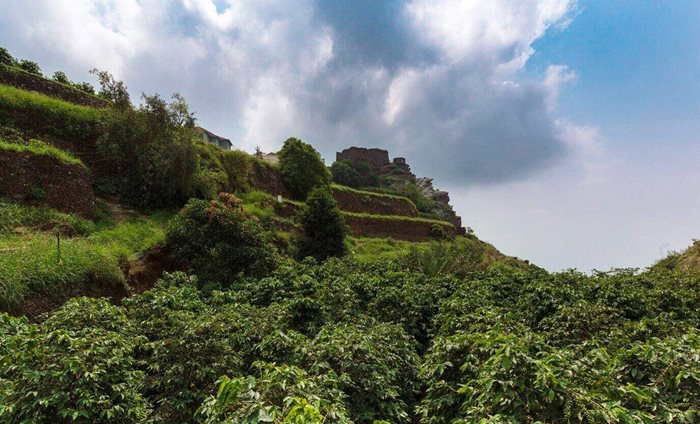
Coffee growing in Saudi Arabia’s Jazan region | Photo credit: Saudi Arabia Ministry of Culture
The brand’s CEO Sohyb Alblushi says Saudi’s coffee shop market has undergone rapid development over the last decade. He observes that while international coffee chains laid much of the groundwork for introducing consumers to café culture, there has been a recent shift towards local coffee businesses.
“Eight or ten years ago people were visiting international brands like Starbucks, Tim Hortons or Costa Coffee. Nowadays they are tending to get their coffee from GCC brands – we’re seeing many businesses coming in from Dubai, Kuwait and Qatar.
“In the last three years, people are also drinking more coffee from Saudi brands because they want to support local businesses,” he adds.
However, Alblushi says consumers have become more price-conscious, in part due to rising costs seen across the globe, but also increased competition and a wider elevation of quality in the market.
“Consumers were not previously price sensitive, but they are becoming more so,” he says. “In the last six months most international and local F&B brands have reduced their prices and are introducing affordable menu items,” he says.
As market competition heats up Alblushi says operators cannot afford to be complacent on delivering quality, consistency and value to increasingly discerning customers.
“Many investors see this as an easy market to enter. However, that doesn’t mean everyone who opens a coffee shop here will be successful. We have seen many coffee shops close recently because they have no clear value proposition for the customer.”
“The competition has become really aggressive and will continue to be so in the future,” Alblushi adds, pointing to the 70-plus coffee shops now residing on King Fahad Road, a popular retail and hospitality strip in the centre of Riyadh.
What drives success
Such is the lightning pace of development in Saudi Arabia’s coffee shop market, operators must be nimble to keep up with changing consumer demand.
“People are catching new trends all the time, so it’s not easy for coffee businesses to keep up. This year, drive-thru is trending and I see long lines of cars queuing up” says MAFAZ’s Alfaez.
In Saudi Arabia’s car-centric cities, drive-thru and convenience-led formats are gaining significant traction as more consumers opt for coffee on-the-go. Reflecting a global coffee shop trend for smaller stores with fewer staff and overheads, Tim Hortons is also investing in drive-thru to complement its existing high dwell time stores.
“Consumers still want to indulge, but they don’t want to go for 2–3-hour visits, they want short stackable experiences,” says Tim Hortons Middle East’s Allibhoy.
Going forward, Allibhoy says drive-thru will account for 30-35% of new Tim Hortons stores in the near term.
“The reality is that if you look at Dunkin’, Barns and others, 50% of their stores are drive-thru. This is the only country in the world where I have seen, and continue to see, individuals willing to wait 20 minutes in their car for a cup of coffee and a donut,” Allibhoy adds.
The drive-thru rush isn’t just limited to large international brands, specialty operators are also seeking a front seat in Saudi’s latest trend.
“Drive-thru really boomed after Covid because people wanted to have contactless transactions. It’s also very crowded here in Riyadh, there is a lot of traffic and it is difficult to find parking,” says Half Million’s Alblushi.
“Itʼs not only about the quality of coffee – it’s about the convenience that you provide for customers,” he adds.
Half Million anticipates around 10% of its new outlets will be drive-thru, with Alblushi adding that relatively few regulatory hurdles continue to make the format an attractive proposition for Saudi operators in the future.
Castles made of sand?
With branded coffee shops now a mainstay in the Saudi hospitality scene, trading on prestige alone will likely yield diminishing returns among the Kingdom’s increasingly clued-up consumers.
Nevertheless, there are few markets around the world where coffee is consumed throughout the day and into the late evening, a factor enabling Saudi coffee shops to sweep up trade normally the preserve of bars and restaurants.
There are also few markets investing so heavily in tourism infrastructure – and even entirely new cities. According to global real estate consultancy Knight Frank, the total value of real estate and infrastructure projects since the launch of Saudi Arabia’s National Transformation Plan in 2016 passed $1.1trn in 2022.
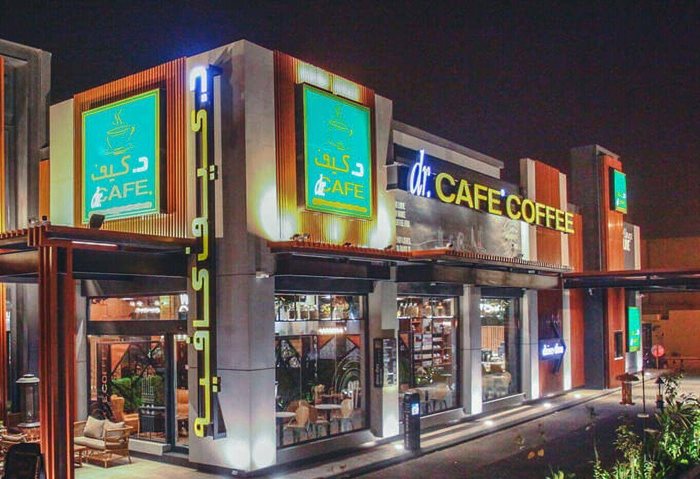
A Dr. CAFE outlet on King Fahad Road, Riyadh, Saudi Arabia | Photo credit: Dr. CAFE
There are currently around 15 ‘giga projects’ in various stages of development across Saudi Arabia, all of which will require a hospitality element, meaning that where one locality may become saturated, there remains plenty of untapped growth potential for coffee shops to thrive elsewhere.
Among them is the $500bn Neom project, a highly ambitious desert city being built on a 26,500sq km coastal strip in Tabuk. “Visitation is not just about a stay in a hotel… It is all the experiences that sit around that – from transport, transfers, food, experiences, events and retail,” the project’s Marketing & Sales Director, Peter Fitzhardinge, told reporters.
Saudi consumers have clearly embraced a new era of contemporary coffee culture, enabling coffee shops to blossom all over the Kingdom. However, this initial stage of domestic-led development could become supercharged if the Saudi government is successful in its goal to boost tourist annual tourist numbers from around 25 million today to 100 million by 2030.
Worlds apart?
The collision of cultures often generates innovation, but it can also lead to discord. As some of the controversy surrounding the World Cup in neighbouring Qatar has underlined, differing social values can have profound implications for trade and business relations.
Saudi Arabia has implemented rapid social reforms, particularly on women’s rights, since 2016, boosting female economic participation and relaxing gender segregation in hospitality venues. Nevertheless, Saudi Arabia’s profoundly traditional society could present a quandary for Western brands, which may need to find room for compromise on some social values they champion at home.
“The Kingdom is looking to build on tradition and expand its coffee growing regions”
Mayada Badr, CEO, the Culinary Arts Commission
Across its economy and society Saudi Arabia still has a long road ahead to realise its bold 2030 Vision. In 2021 the Kingdom remained 75% dependent on oil exports for its budget and the country continues to face criticism on issues such as human rights and freedom of expression.
But the opportunities for coffee and hospitality businesses are undeniable, as is the rapid pace of progress in what is fast becoming one of the 21st Century’s development hotspots.
Kaldi Coffee founder Hans Tietema says he knew very little about Saudi Arabia before visiting for the first time in 2020, but that he arrived with an “open mind” about doing business there. “We don’t speak the language and there is a big difference in culture, but I’ve been surprised at how quickly the culture is changing,” he says.
“There are a lot of people who are not positive about Saudi Arabia, but it’s easy to judge. They are balancing religion, tradition and progression in a very small court – thatʼs not easy. But if I look at the progress they are making, then I’d say they’re making big steps,” Tietema adds.
That Saudi Arabia is laying the ground to shift away from its lucrative oil economy is a positive sign for a world wrenching itself away from fossil fuel dependency. The Kingdom has also shown pragmatism by implementing social reforms unthinkable a few decades ago as it prepares to usher in a new era of international commerce.
While the progress is by no means perfect, Saudi’s new black gold rush is yet further evidence of the positive change that coffee and café culture can have in an increasingly uncertain world.
This article was first published in Issue 13 of 5THWAVE magazine.
Subscribe to 5THWAVE to receive each edition in print and digitally or sign up to our newsletter and be the first to read the latest articles and updates on World Coffee Portal research.